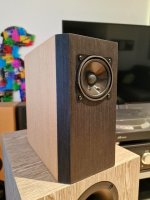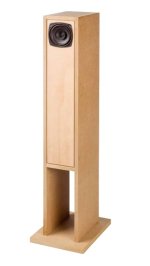CHP-90
More realistically a 4.5-5”. As P7HD evolved from A7.3 the CHR/CHP-90 evolved from the A10.3/p.
dave
SS 10f
A 3” driver, others are Alpair 5.2/3 (CHN-50) or Fostex FF85wk (a few tweaks make a big difference)
dave
I think it's a bit strange area described on CHP90 (85cm2). When I measure the diameter of the CHP90, it is under 4". Then I measure half the suspension.More realistically a 4.5-5”. As P7HD evolved from A7.3 the CHR/CHP-90 evolved from the A10.3/p.
dave
Am I thinking wrong?
Last edited:
The cone is 90mm diameter, apparently, which is about 3.5 inches. When a cone moves, the surround moves with it. The further out across the surround you go, though, the less movement there will be, until, where the surround meets the frame, it won't be moving at all. So, to calculate the real effective radiating area, you need to include approximately half the width of the surround.
Sd of 85cm2 equates to a diameter of about 104mm, or 4.1". (Planet10's 4.5-5" is misinformation.) So about 7mm of surround is included in the calculation of effective radiating area. (Incidentally, the frame is 139mm across, or 5.5".)
How wide is the surround?
Sd of 85cm2 equates to a diameter of about 104mm, or 4.1". (Planet10's 4.5-5" is misinformation.) So about 7mm of surround is included in the calculation of effective radiating area. (Incidentally, the frame is 139mm across, or 5.5".)
How wide is the surround?
Last edited:
... a few tweaks make a big difference ...
Yep, it's definitely worth the extra mile, especially for 4-inchers. The two very best widebands I ever had in my shack were modified SEAS W12CY drivers. I replaced theirs membranes with audio certified full ceramic ones.
... talking about EnABL treatment for speaker ...
Some advanced EnABL to the basic ceramic mod decently, but very distinctly further improved the sonic result. For very best results I selectively applied different patterns (symmetrical/asymmetrical ones) matching the basic vibrational behavior of the membrane's different (central/periphery) zones.
Unfortunately these two jewels of educated DIY craftmanship ended up with burnt voice coils while trying to archieve some louder SPL.
Last edited:
i like visaton sl87 fe driver, nice polyprop cone, measures well.
here ready made design from donhighend
https://www.donhighend.de/?page_id=10183
here ready made design from donhighend
https://www.donhighend.de/?page_id=10183
Attachments
So does that mean you share my preference for the timbre of paper over metal or other synthetic material?Or Markaudio CHN-110 or CHN-50, neither of which is a 4”
In ref to Mayhelm’s comment, the Alpair 7.3 has been revised into the Piuvia 7HD, demoted from Alpair 7.4 i figure because the monoSuspensions have overtaken that range. A price drop doesn’t hurt at all.
dave
In all fairness though, I don’t think any of this makes a dam bit of difference in the mid to far field listening position……i can only proclaim my preference in the near field in a monitoring application. After a meter or so of distance , the acoustics of the space swamp out whatever differences exist.
@Daihedz
How did you change the magnesium cone? Are you a professional - you need lots of knowledge and equipment to change completely this part of the driver!?
With some notch filter maybe the original cone can be tamed to sound acceptable.
But then destroying 300 euro drivers is really a pity. And all the invested work.
The cone treatment was more a work of art than just acoustic treatment.
How did you change the magnesium cone? Are you a professional - you need lots of knowledge and equipment to change completely this part of the driver!?
With some notch filter maybe the original cone can be tamed to sound acceptable.
But then destroying 300 euro drivers is really a pity. And all the invested work.
The cone treatment was more a work of art than just acoustic treatment.
Im sure that grandma took those drivers back in glass display in her living room, so they are in good use
So does that mean you share my preference for the timbre of paper over metal or other synthetic material?
In general, but Mark moved the posts with the first A7.
Much later the A7p came out, and we had a paper cone that sounded like the “generalized” metalcone, and the metal (at least once EnABLed) like paper.
dave
I think it's a bit strange area described on CHP90 (85cm2). When I measure the diameter of the CHP90, it is under 4". Then I measure half the suspension.
Am I thinking wrong?
Nominal size is typically the basket size. I expect that given the 90, the cone itself will be close to 90mm.
dave
I'm pretty sure he was joking.
Yes. Sometimes I do and this time I was.
With some notch filter maybe the original cone can be tamed to sound acceptable ...
But then destroying 300 euro drivers is really a pity. And all the invested work ...
The cone treatment was more a work of art than just acoustic treatment ...
And now I switch back into the reliable, serious modus again ...
I do not consider the W12CY001 to be a wideband driver. I had 6 of them and used 4 of them in the range of 700Hz ... 2kHz within a low-distortion Horbach-Keele Array. More generally, this driver has a steady rise of HD above 2kHz, which not only seems to be related to it's two (!) prominent cone breakup resonances around some 10kHz. In a passive or active system with non-LTA filters (such as Linkwitz-Riley) you would indeed have to provide a notching filter stage to suppress the effect of these cone breakup resonances. Instead, using it along with DSP and LTA filters, a single filter x-overing at 2 ... 2.5kHz will perfectly work, being down to zero output at 4 ... 6kHz anyway. In these terms, real broadband drivers are nice because there is more freedom in terms of filters choice. Possibly not needing extra notching filters.
Despite the price of these drivers I tried to modify the membranes in two of them by bonding small radial carbon profiles into theirs cone surface, and also by bonding some circular turns of a slim carbon string at the bonding edge of the rubber surround. The only effect was that the resonance got a lower Q, thus making it's peaking amplitude a bit smaller, but it's base wider instead. So no gain in terms of a better frequency response above 2kHz. Furthermore, the added mass lowered the SPL/Veff sensitivity. Removing these carbon mods was performed by milling them away. The drivers would not look neater after this treatment, but definitely they were not distroyed.
Cone treatment may have some effect along with absorbing cone materials, thus altering the local weight/damping/stiffness ratio. Instead, superficially applying some colored dye dots onto non-resorptive membranes like ceramics or delft art such in my prior mock post may at best look fancy to the intended target public and/or potential customers. In these terms ...
Im sure that grandma took those drivers back in glass display in her living room, so they are in good use
... you are perfectly right.
By the way and talking about the W12CY001 and all others of the Excel magnesium line: These drivers are really excellent if used in a correct way. I also owned four W22EX001 which I buyed for my Horbach-Keele arrays. But after some time and also as other persons have published, two of the W12 and two of the W22 showed more or less some magnesium corrosion. Having said this, I live in central Europe in an aera with moderate athmospheric moisture conditions. Not near the seaside with salty damp in the air. I was then very disappointed and also angry: I would have expected SEAS to offer a fair exchange program for all these owners of theirs in terms of durability severly flawed drivers. Therefore I would no more buy any these drivers. If I needed some magnesia, then there is some to have for much, much cheaper elsewhere. And I am also not keen to "upgrade" to Seas Excel's graphene line while hoping that these membranes are less prone to longterm deficiency.
Last edited:
An addendum near-close to the thread's title:
My longterm favorite 4" driver is/was/would be in fact ... two 3" drivers: Twice the cute Eton 3-400/A8/24Mg. I never owned these, and I never will. Unfortunately. Because I came too late to the party. These drivers already had vanished from the market by the time I got attentive to them. Oh no! They had a very solid reputation due to theirs low distortion profile and were sold in pairs at a reasonable, non-boutique price.
Does anybody know why these little marvels were discontinued?
My longterm favorite 4" driver is/was/would be in fact ... two 3" drivers: Twice the cute Eton 3-400/A8/24Mg. I never owned these, and I never will. Unfortunately. Because I came too late to the party. These drivers already had vanished from the market by the time I got attentive to them. Oh no! They had a very solid reputation due to theirs low distortion profile and were sold in pairs at a reasonable, non-boutique price.
Does anybody know why these little marvels were discontinued?
implementation of a 4 inch driver can be more important than the absolute quality of a driver
here an example for a well made affordable paper cone speaker
https://www.donhighend.de/?page_id=429
here an example for a well made affordable paper cone speaker
https://www.donhighend.de/?page_id=429
Attachments
OK, I give up! Isn't there a dedicated thread or at least some links to the originals?EnABL ed
- Home
- Loudspeakers
- Full Range
- Your favorite 4” wide band driver?

